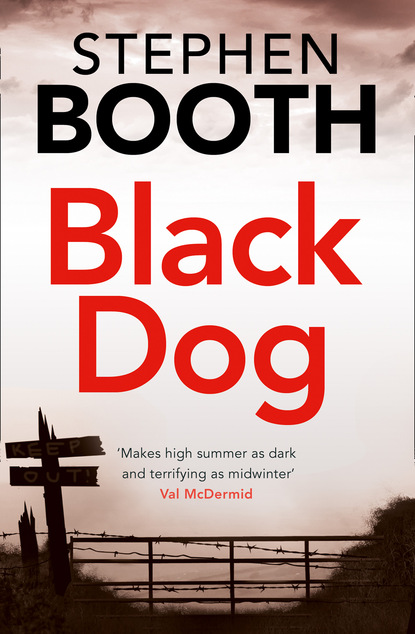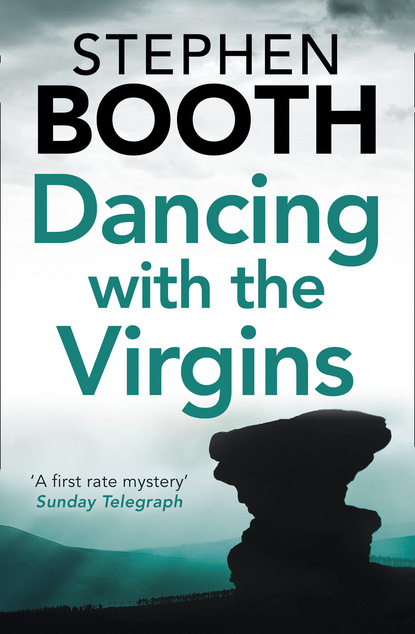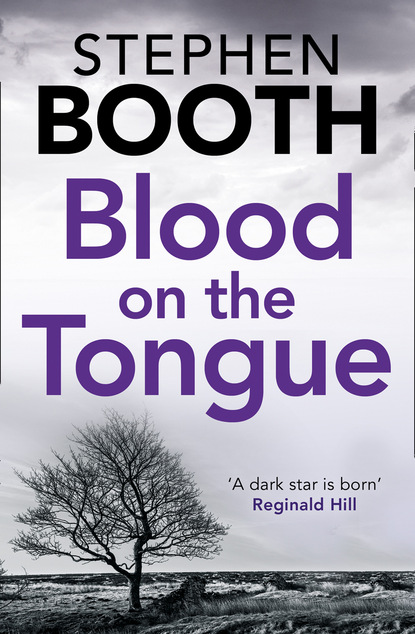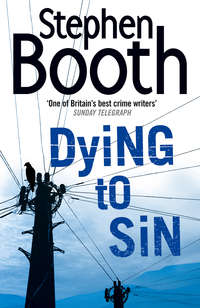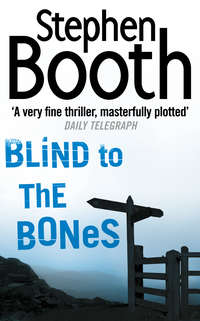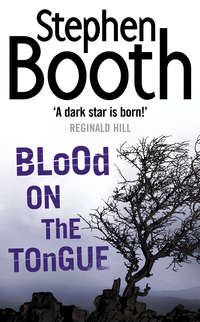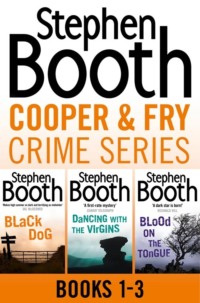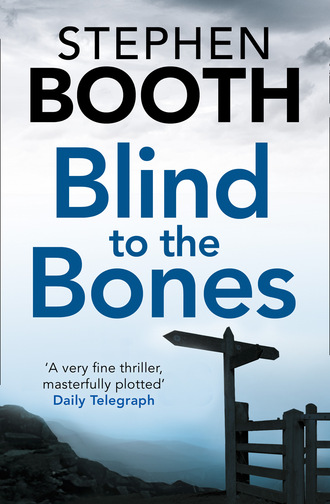
Полная версия
Blind to the Bones
Sarah wiped a tear from her eye. She caught herself just before she spoke aloud, and dropped her voice to a whisper, so that Howard wouldn’t hear her.
‘I’ll help you put them back exactly how you want them, dear. We’ll do it together.’
Sarah turned away from the bookcase and took down a calendar from the top of the TV set. She crossed off another day, neatly deleting it with two short, sharp strokes of a black marker pen.
It was Day 743. Emma Renshaw had been missing for over two years.
Now the laughter in the village had subsided, or the woman making the noise had moved out of earshot. Derek Alton stood in his church porch and listened to the sound of Neil Granger’s car engine as it moved slowly out of Withens. It climbed the road away from the village and began to cross the miles of bare moorland towards the valley of Longdendale.
Finally, even the sound of the engine disappeared behind the hill. The blackbirds settled into the yew trees, Alton’s breathing returned to normal. And as it grew dark, Withens became almost entirely silent. Except for the screaming.
2
Saturday
With a heave of his shoulders, a police officer in body armour swung the battering ram. The door split at the first impact. He swung a few more times, and the thump of steel hitting wood wrecked the stillness of the early morning. A burglar alarm began to shriek as the lock shattered, and the officer gave the door a kick with his boot.
Standing in the damp bracken at the edge of the road, Detective Constable Ben Cooper watched officers wearing Kevlar vests burst into the house as their team leader began to shout instructions. The door had given way a bit too easily, he thought. Maybe the householder should have spent more money on security, and less on the plate glass and patios.
‘Well, they give the impression of people with nothing to hide,’ he said. ‘But God knows what all that glass does to their heating bill.’
Cooper could feel a fine rain in the air, like feathers touching his face. Sunlight and showers were passing across the hills so quickly that it was almost dizzying. Though he was standing still, he seemed to be moving from darkness into light and back again, as the clouds obscured the sun, showered him with rain and were blown westwards by the wind. The raindrops hardly had a chance to dry on his waxed coat before the next bank of clouds reached him.
For some reason, PC Tracy Udall was wearing her body armour, too. No doubt it was a sensible precaution, but it looked a bit odd when the most dangerous thing in sight was a patch of stinging nettles. Besides, she seemed to Cooper like a candidate for a breast reduction operation to make the vest fit properly.
For the moment, PC Udall had left her yellow waterproof jacket in the car. But the banks of darker clouds rapidly moving towards them from the east suggested that she might regret moving too far away from the car without it.
‘If we’re right about their source of income, they won’t be worrying about sharing a bit of it with Powergen,’ she said.
He wiped the rain off his binoculars so that he could study the house more carefully. It had been a farmhouse at one time, but part of the side wall had been taken out and replaced with floor-to-ceiling glass, which must let more light in than had ever been seen by several generations of Derbyshire hill-farming families. There was new glass at the back too, and dormer windows had been built into the stone-tiled roof.
The room he could see through the glass had a floor made from patterned blocks of light-coloured wood, where once there would surely have been stone flags. There was a glimpse of light from another window way down at the far end. That could only mean that an internal wall had been removed to create one large room running right through to the back of the house. An estate agent would probably call it an open-plan living space.
As they had descended into the valley, the police team had been careful not to disturb the dawn with the lights of their beacons and the wail of their sirens. But now the time for discretion had passed. On the way to the raid, one of the task force officers had joked that they’d need to get inside the house quickly to be out of the rain. Kevlar fibres were known to deteriorate if they got wet. Also if they were exposed to direct sunlight. That was why police officers in body armour never went out in sunlight, or so they said. But at least it provided a lot more protection than if you had left it hanging in your locker at the station.
A few hundred yards beyond the target house was another cluster of roofs, including a number of old farm buildings, one of which had been converted into a double garage. But there was also a four-wheel-drive vehicle standing on the brick-paved driveway – a Toyota or a Mitsubishi, he couldn’t quite be sure from this distance. As he watched, a large, shaggy-haired dog wandered into sight, sniffed at the vehicle’s front near-side tyre, looked over its shoulder guiltily, and slunk off towards the back of the house. There was a paddock at the side of the driveway, newly fenced and containing a Shetland pony, a Jacob sheep and two Muscovy ducks.
‘What about the neighbours?’ said Cooper.
‘Well, the house actually belongs to an architect,’ said Udall. ‘Apparently, he’s employed by the Cooperative Society, and he designs grocery shops and crematoria for a living.’
Udall had an air of briskness that Cooper liked. In the car on the way from Glossop section station, she told him that she’d been in the force ten years. She was a single mother, and had joined up after her youngest child was old enough to attend nursery school. When she had been on the wrong shifts – which she usually was, she said – her mother had collected the children from school. Now her son was thirteen, and she was starting to get worried about him.
‘Grocery shops and crematoria?’
‘Or, as Sergeant Boyce puts it, “rashers to ashes”. He’s a scream.’
‘Every team needs a comedian.’
‘But the architect is working abroad. Somewhere in the Gulf States, I think. So he leased the house for a couple of years. The present occupier also has an address in South Manchester, where his neighbours say he’s a motor dealer.’
One of those brief, unnerving silences had developed down at the house. The officers waiting outside checked their earpieces. These moments never lasted long, but they were worse than any amount of overexcited shouting over the airwaves.
Cooper looked at the unused farm buildings and thought of his brother Matt, struggling more than ever now to support his family on the income from Bridge End Farm. Revenue from livestock farming had plummeted, and not just because of the aftermath of the foot-and-mouth outbreak. Farmers like Matt lived on a knife edge, wondering when the bank would pull the plug on their overdraft. There were some advantages to a regular salary from Derbyshire Constabulary, after all.
‘What about the barn conversion?’
‘Holiday lets,’ said Udall. ‘It’s divided into two studio apartments, with a shared patio round the back. No doubt they provide a useful bit of extra income, in case the crematorium market dries up.’
‘Not much chance of that. There’s no shortage of people to burn. And nowhere to bury them these days, either.’
‘No, the graveyards are really in demand. People are dying to get in them.’
‘Is that one of Sergeant Boyce’s, too?’
Udall flushed a little, but said nothing. She tugged at the bottom edge of her vest to pull it down over her hips, where her duty belt was heavily hung with baton, handcuffs, CS spray, and a series of leather pouches that Cooper had forgotten the use for. In fact, he didn’t think they even had all those things to wear in the days when he was in uniform. Changes happened fast in the police service, and six years away from a uniform was long enough to get out of touch.
Tracy Udall had dark hair pulled back almost painfully tightly into a short ponytail that protruded from her white trilby-style hat. Cooper had presumed from what she’d told him that the father of her child hadn’t been around from the word go. Now she must be only a couple of years on the other side of thirty. Unfortunately, Sergeant Jimmy Boyce was married, with four kids of his own.
Cooper knew he could probably learn a lot from PC Udall and her colleagues – the day-to-day, on the ground stuff about policing that had started to pass him by after six years at a CID desk in Edendale. It was his chief superintendent at E Division who had first uttered the words ‘lateral development’ when he had failed to get promoted to the detective sergeant’s job he had hoped for. Lateral development meant a move to a different speciality without the benefit of promotion, but it came with the suggestion that wider experience might count favourably towards future advancement. On the other hand, his mother might have said it was just a case of ‘always jam tomorrow’.
Yet, suddenly, here he was on a secondment to the Rural Crime Team – playing an advisory role to Sergeant Boyce’s pro-active squad of uniformed officers. These were people who knew the problems of the Peak District’s villages. They had gained their knowledge from years as community constables, liaising with the local people and listening to their troubles. Those troubles often involved a catalogue of burglaries, petty thefts, vandalism and car crimes that were committed with impunity, to all intents and purposes. Prioritization was the buzz word these days, and property crime was low priority. Members of the public in some areas could consider themselves lucky if they got any police response at all, except for the offer of a crime number for their insurance claim and a sympathetic letter from Victim Support.
Cooper was glad to help, if he could. But while he stood with PC Tracy Udall on this roadside in the Longdendale valley, he couldn’t help wondering if this was the first step on the path of his lateral development. Was Sergeant Boyce tipped to move onwards and upwards after the initial success of his team? Did a uniformed sergeant’s job await some lucky detective constable in a few months’ time? He wondered what Detective Sergeant Diane Fry would make of that, as his immediate supervisor. But it didn’t take much effort to imagine the smile on her face. She would be glad to be rid of him, he was sure of it.
Now Cooper was standing in sunlight, and he found he was sweating under his waxed coat. It was one of those spring days when you didn’t know what to wear when you went out in the morning. Whatever you chose, you knew you were going to get wet, or too warm. Probably both. There was nothing predictable about the weather in the Peak District at any time of the year, no matter how long you lived there. Outdoors, you were forever taking off layers of clothing and putting them back on again, as you passed from sweaty uphill slog to the biting wind of an exposed plateau. In April, you never knew from one moment to the next what sort of weather was going to hit you. A squall, a gale, a deluge of hailstones, or a warm burst of sun – you could get it all within an hour.
Down in the converted farmhouse, the suspects roused from their beds would be getting ready for a trip. With a bit of luck, they wouldn’t be seeing much sunlight for a while.
‘An isolated farmhouse is an ideal base for an illegal operation. And God knows, there are plenty of those between here and Edendale,’ said Udall.
‘Too many,’ said Cooper.
‘And they make great drugs factories particularly. It’s taking diversification a bit far, if you ask me. Definitely too far. If they can’t make a living at farming, they should stick to opening tea rooms and doing bed and breakfast.’
‘But there’s more money in drugs. And you don’t have to deal with tourists.’
‘The neighbours are going to get a shock,’ said Udall. ‘You can see they’ve got no security to speak of. There are no walls and no gates, and the lights are mostly to show off the garden and the fish pond. And the Afghan doesn’t look as though it would put up much of a fight.’
‘People are used to thinking that they don’t need to set up fortifications around their homes in this area.’
‘Ah, but the architect isn’t from this area. He lived in Sheffield until two years ago. He ought to know better.’
‘It’s the scenery,’ said Cooper. ‘It gives people a false sense of sanity.’
If Cooper were to be honest with himself, his short spell with the E Division Rural Crime Team was already starting to feel like a breath of fresh air. Winter in Edendale had been long and hard, and full of other complications. Diane Fry, for one.
And then he had chosen to move out of Bridge End Farm for the first time in his life. He had left home at almost thirty years old, and now he had all the business of looking after himself, and the unexpected implications of having property, even though his flat in Edendale was only rented. He had his own territory now, and that made life look different. That, and his looming thirtieth birthday, made a lot of things look different. It was as if he had suddenly been lifted out of his old, familiar rut and pointed in a different direction, so that he wasn’t quite sure who or what he was any more. In fact, he was a bit like the former farmhouse down there – designed for a different purpose entirely.
‘Besides, houses like this need security these days. Almost every house of any size in Longdendale has been targeted by thieves during the last eighteen months or so,’ said Udall. ‘Some of them have been hit more than once. If the thieves don’t get in the first time, they do a recce and come back later.’
‘Professionals, then?’
‘No doubt about it.’
‘Local? Or the travelling variety?’
‘Well, we definitely think they’re using somewhere on our patch to store the stuff they’ve nicked. Another isolated farmhouse, probably.’
‘What items are they going for?’
‘This lot go for antiques: clocks, porcelain – anything small that looks as though it might be worth a bit of money. There’s a huge market for that kind of thing. It’s likely they’re collecting enough for a vanload, then shipping it off to the States or somewhere in Europe. Easy money, all right.’
The Shetland pony was deliberately bullying the two Muscovy ducks, nudging them around the paddock until they began to flap their wings and quack angrily.
‘Did the architect design the alterations himself?’ said Cooper.
‘I believe so. But he seems to have designed them for looks, rather than with security in mind, doesn’t he?’
‘You’re right. He really should have known better. Here they come.’
The task force officers were escorting two men out of the target house. Each man had his hands cuffed behind his back and an officer gripping his elbow. They looked as though they had dressed hastily in whatever had come to hand first. Much as Cooper had done himself, in fact. But these two would have the chance to put their feet up for a while in a warm, dry cell when they reached the section station at Glossop.
Cooper turned the binoculars westwards, looking for more signs of civilization in the bare Dark Peak landscape of peat moors and heather. His attention was caught by a small, tree-lined valley and the glimpse of a church tower.
‘What’s over there?’ he said.
‘That? Oh, that’s Withens.’
Cooper could hardly see the village itself. It seemed to be lying in the bottom of a hollow, slipped casually into a narrow cleft in the moors. There were trees above the village on the lower slopes, through which the roofs of houses were barely visible. But the valley was so narrow that it looked as though the two facing slopes were only waiting for the right moment to slide back together and crush the village completely, and all its inhabitants with it.
‘Withens,’ said Cooper, trying the sound of the name in his mouth as he might taste an unfamiliar morsel of food, not sure whether it was going to be bitter or sweet, soft on the teeth or difficult to chew.
Above the village was a moorland plateau, a gloomy blend of dark khakis and greens, with no sign of the purple flowers of the heather that would bring colour in the summer. Much of the landscape up there would be quagmire – a wet morass of peat bog that shifted underfoot, sucking at the soles of boots and clinging to trousers. Across the valley, Bleaklow Mountain stood right on the watershed of England, and attracted sixty inches of rain a year to its wastes of haggs and groughs.
‘I thought we’d go down to the village and take a look when we’ve finished here,’ said Udall. ‘You might be interested to see it. Withens has its own problems. As it happens, the local vicar reported a break-in yesterday.’
‘Fine.’
Cooper noticed a pair of black shapes in the distance, circling over the moor. He turned the binoculars towards them, grateful for any sign of life in the landscape.
But this wasn’t the sort of life he welcomed. They were carrion crows. Though he couldn’t see what had attracted them, he guessed they probably had their eye on a weak lamb. Sometimes, before shearing, their prey might be an adult sheep that had rolled over and couldn’t get up again because of the weight of the unshorn fleece on its back. But in the spring it was the sickliest lambs that the crows were looking for as they flapped and circled over the moors. Just now, their diet would consist mostly of young grouse and the eggs of other birds. But a weak lamb was a great bonus. Its carcass would last them for days.
If they’d found a lamb up there, then they would land in a little while and perch on a handy rock as they waited patiently for it to weaken enough to be helpless. Then they would begin to work on its eyes, picking at the white flesh as if they were delicacies that had to be eaten fresh. And once the lamb was blind, the crows could eat the rest of it at their leisure, while it died.
Cooper lowered the binoculars and looked up at the dark bulk of the hills beyond Withens.
‘Tracy, have you noticed the smoke?’ he said.
Udall followed his gaze. ‘Hell!’
Black clouds were billowing across a wide stretch of the moor, with an occasional flicker of flame visible behind them. The seat of the fire looked as though it might be just below the horizon. PC Udall went off to her car to use the radio, but was back in a couple of minutes.
‘Moorland fire. They think it was started by some kids on a school outing from Manchester. The fire service are turning out all the crews they can muster, but it’s right on the summit above Crowden, so it’s pretty inaccessible. The poor bloody firefighters will have to do the last half-mile on foot with their equipment. They’re also saying they might have to mobilize the helicopter to bomb it with water from the reservoirs.’
‘Beyond our remit, anyway,’ said Cooper.
‘Thank God.’
A gust of wind blew along the road and another shower spattered their faces. But there was too little rain to help the firefighters.
‘I think they’re ready for us down there,’ said Udall.
‘OK.’
Cooper took one last look at the moors above Withens. The smoke was spreading in the wind rolling low over the heather. But in front of it, blacker even than the smoke, the two carrion crows were still circling.
Even before the sun had risen on Withens Moor, Neil Granger had known he wasn’t alone. He had been standing with his back to one of the air shafts above the old railway tunnels, facing east towards the approaching dawn. There was nothing but air between his face and the black ridge of Gallows Moss, where the light would soon begin to creep up among the tors.
Every sound from the surrounding valleys had reached his ears – a bird splashing out of the water on one of the reservoirs in Longdendale, the growl of an engine on the A628. Even the slightest movement of the wind stirred the coarse grass, like fingers groping for his presence in the darkness. The air was so clean that he could taste the first vapour rising from the dew on the heather, like the tang of cold metal in his mouth. But in a few minutes, the dawn would take away the darkness and the dew.
At first, the sounds he heard nearby could have been the shifting of small pieces of stone on the slope behind him. The scree was loose, and the changing temperature could easily make the stones move against each other. But gradually Neil became aware that someone had walked up to the air shaft behind him. Now, he thought, they were probably resting on the other side of the high, circular wall.
‘Well, I’d given up on you,’ said Neil. ‘I was starting to think no one was coming.’
His voice dropped into the valley, carried away on the wind. There was no response from the darkness, and he smiled.
‘It’s a bit of a steep climb, isn’t it? It creased me up completely.’
He expected to hear someone gasping for breath. But there was nothing – only the darkness and the distant sounds from the valley.
‘I’m so unfit after the winter that, by the time I got to the top, I thought I was having a heart attack.’
He paused, but still there was nothing.
‘I thought I was going to die up here, and nobody would know. If I’d died and you hadn’t come, then no one would have found me for days.’
Neil glanced at Gallows Moss. A pale wash of colour was starting to touch the clouds. He raised his voice a little, as if the appearance of the light had revealed something that he hadn’t suspected until now.
‘Are you all right?’ he said. ‘Do you want a hand?’
Neil waited in the silence, no longer facing east, but looking back over his shoulder into the west. Away from the light and towards the darkness. Something was different. The wind no longer felt refreshingly cool, but was cold enough to make him shiver. The sensations against his face weren’t like gentle fingers, but sharp claws scratching his skin. The air didn’t taste of the dew, but of an unnamed fear. Neil wondered if he would ever hear the first bird calling at the sight of the rising sun. It had been only the darkness that had made him feel safe, after all. And in a moment, the dawn would take away the darkness.
‘Yes, I thought I was going to die up here,’ he said.
The first blow that hit him was so unexpected – like the world falling in, like a ton of stone toppling on to him from the air shaft, or a train bursting out of the ground from the old railway tunnel.
Neil went down, instantly unconscious, crashing on to the stones with a thud and crunch of bone. Part of his scalp had peeled away, and the bone underneath had shattered, ripping the membrane that covered the brain. Within a few moments, his cerebrospinal fluid was leaking from the tear on to the stones – stones that were already covered in blood that was spreading from his scalp wound. Blood had matted his hair and trickled in small rivulets down his face and neck, forming an interconnecting web like the meandering channels that drained the peat moor on which he lay. But the blood could find nowhere on his skin to settle and dry. So it continued to trickle across the greasy surface until it touched the stones and ran into the ground.
Where the fluid was leaking from his brain, infection would soon enter. But it would be too late to matter. Part of his brain tissue had been bruised by the impact, and now a small haematoma was forming deep among the tangled pathways and ganglia. The haematoma would be fatal.
But Neil might still have survived, if he had received urgent attention in a hospital emergency room. A neurosurgeon could have ordered a CT scan, operated to remove the haematoma, then sutured the membrane and carefully picked out the remaining bone fragments. With immediate surgery and a course of antibiotics against the infection, Neil might have lived.
But Neil Granger was destined never to reach a hospital, or a neurosurgeon. As his life oozed away into the peat, there was one person who waited for him to die. But there was no one to call an ambulance. Neil would never recover from the unconsciousness that followed the first blow to his head, or the coma that the second produced. He would never know what happened after he was left alone, and never feel the fear of what would happen to his body after death.




